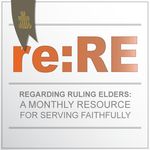“Not my will, but your will be done.” These words of Jesus, prayed in the garden before his arrest, are the heart of the spiritual leader. Leaders who are Spirit-led, seek God’s will for themselves, their congregation, and the world in all circumstances.
Ruling Elders “are chosen by the congregation to discern and measure its fidelity to the Word of God, and to strengthen and nurture its faith and life.”
(G-2.0301).
Our Book of Order defines the ministry of ruling elders as one of discernment and governance. “As there were in Old Testament times elders for the government of the people, so the New Testament church provided persons with particular gifts to share in discernment of God’s Spirit and governance of God’s people” (G-2.0301). Moses appointed elders from the twelve tribes to hear the needs and grievances of the people. Like Moses, they were people (in this case men) known for their spiritual maturity and wise counsel. Governing, or judging as it was called, was an act of discerning God’s will, and directing the people to obey.
information provided here:
Please contact Martha Miller at martha.miller@pcusa.org and browse the Ruling Elders Web site.
As the early Christian church grew, elders were selected from the people to serve the congregation. Again, these were people of good standing, spiritual maturity, and wisdom. Church leaders dedicated themselves to prayer, worship, and serving the people.
The Book of Order reminds us that ruling elders are not thus called because they “lord it over” the congregation. Ruling elders are chosen “to discern and measure [the congregation’s] fidelity to the Word of God, and to strengthen and nurture its faith and life” (G-2.0301). Discernment is the key to the ministry of ruling elder. Discernment is the act of listening for and to the Spirit, and seeking God’s will.
I offer here seven keys to being a spiritual leader. This is not a complete list, but a starting place. As you read this list, consider how you fulfill the role of spiritual leaders. What are your particular gifts of spiritual leadership? How do your words and actions at session and committee meetings, and in congregational leadership show that you are a spiritual leader? What changes can you make to grow stronger as a spiritual leader?
- Spiritual leaders are first followers. Christ is the Head of the Church, and the great shepherd of the flock. We lead best when we first follow.
- Spiritual leaders are called, and understand our role as a vocation given by God. Though people handle the selection and election process, we believe that the Spirit speaks through the congregation and nominating committee. When we say “yes” to serving, we do so because we believe the call comes from God.
- Spiritual leaders pray. Individual and communal prayers are the impetus for knowing God’s will. Prayer connects us directly to the source of our being, and enables us to hear and feel the heart of God.
- Spiritual leaders desire an intimate relationship with God, and make time to nurture that relationship. This means a daily discipline of prayer, Bible study, meditation, and other means of focusing on God and where the Spirit is leading. It also means fully participating in the life of a worshiping community. Worship is vital to living in intimacy with God.
- Spiritual leaders practice Sabbath. Sabbath allows us to rest in God’s grace, and be present with and for God in a way that we cannot be with all of life’s responsibilities and distractions. It centers us, renews us, and refocuses us on who we are and whose we are.
- Spiritual leaders love their people. It is not enough to serve the community, Christ calls us to love them, and put them before ourselves.
- Spiritual leaders practice humility. When we become more interested in serving our own will, speaking our own mind, and getting our own way, we lose the ability to hear what the Spirit is saying to us. When we put our egos aside, and sincerely seek God’s will for the benefit of those we serve, we are able to lead with wisdom and integrity.
The Reverend Dr. Peggy C. Hinds serves as associate general presbyter for Mid-Kentucky Presbytery. She has written several articles and curricula, including the newly released workbook, “Ruling Elders: Transformation,”part of the Being Reformed series from Congregational Ministries Publishing.

